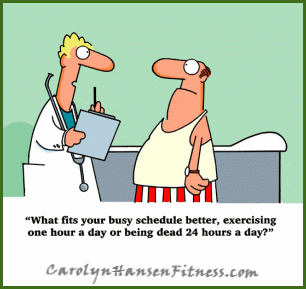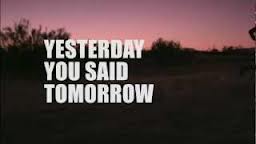
If you are like most people, you can probably come up with plenty of reasons (excuses) for why you are not more active.
You’re too young, you’re too old, you’re too busy, you’re too tired or you’re in pretty good shape – for your age. But with few exceptions, these excuses are pretty flimsy. There is no excuse unless you happen to be paralyzed from the neck down.
So the next time you think about getting fit, don’t ask “Who has time?” Instead, ask yourself “Who doesn’t want to feel better?” Or “If I don’t take care of myself who else is going to?”
It is easy for us humans to come up with excuses not to be active and why we should not stick to our exercise program. These excuses appear more frequently when our motivation levels begin to wane and we lose sight of our health and fitness goals.
“But I’m tired,” you tell yourself. “I’ve had a long day and I deserve to sit back and relax. I’ll just take it easy tonight and I promise to work out tomorrow.” Then tomorrow comes and you’ve got to work late and you’re out of milk so you have to go buy groceries and before you know it, another day has passed and still no exercise.
Why is it that you can hold down a job, make it to class, run a household and put everyone else’s needs ahead of your own, while you disappoint yourself every time you miss your own appointment with your exercise program?
Since excuses are really just a lack of motivation, you will need to anticipate and counter them if you expect to maintain a high degree of motivation. Here are five common excuses people tell themselves to get out of exercising, and how you can overcome them.

Recognize any of these?
Excuse: “I hate exercise, so I can’t seem to make myself do it.”
Stop dwelling on negatives! Rather than focusing on your “hatred” of exercise and your need to “make yourself” do it, turn your thinking around and focus on the positives: feeling great when you exercise, and how good you will look as you stick with it over time.
Excuse: “I don’t have time.”
Although this is a tempting one, deep down you know that your physical health and wellbeing are more important than most of the other things you make time for. To prevail against this excuse, it’s important that you plan your fitness schedule just as you plan your career schedule. Get up an hour early if you have to, or go to bed an hour later, or cut something else from your life.
Excuse: “I just don’t have the energy.”
Of course you don’t have energy yet! But an exercise session will give you more energy. Your body makes feel-good hormones (endorphins), and you are getting the circulation going.
Increased vigor and energy come from the exercise that you have been neglecting. So instead of accepting your fatigue, just think about how wonderful it will be to feel young and alive again. Once you get excited about the thought of feeling energetic, you will be motivated to hit the gym and make it a reality.
Excuse: “I’ll start exercising after I’ve lost some weight.”
Remind yourself that exercise is actually what’s going to help you lose the weight, because it burns calories and builds your metabolism. Exercise also reduces your cravings and curbs your appetite. Plus, not exercising while losing weight can lead to losing muscle tissue, which makes it very difficult to keep the weight off.
Excuse: “I’m so out of shape that I don’t even know where to begin.”
You need to tell yourself that it’s ok not to know where to begin. Begin anywhere! Just begin now. In three months, you will be leaner, stronger and more energetic.
So, what’s your excuse?
The bottom line is that no matter what you are telling yourself, no excuse in the world is legitimate when your health is at stake. The gym is full of people who have less time than you, weigh more than you and have less energy than you.. Yet, there they are, investing in their health.
You promised yourself that you would exercise “tomorrow.” But tomorrow turned into a week, and a week turned into a month. And now, six months later, you still haven’t taken your first steps on your path to fitness. Or, perhaps you started going to the gym twice a week, missed a couple workouts, and then stopped going for a whole three months. In either case, you have let your excuses stop you from investing in your health.
Although one or two missed exercise sessions may feel insignificant at the time it may signal the beginning or a much more important motivational lapse that can cause a critical change in a person’s commitment to a healthier lifestyle. All lengthy breaks in exercises begin with a missed session or two.
What can separate a single missed session from the “beginning of the end” is what happens on the next scheduled session. It is important that you do not miss this session and if you have more excuses not to exercise examine them and come up with a solid plan to counter then and get yourself back on track immediately.
It is normal for commitment and motivation levels to be stronger or weaker at different times. What got you going yesterday may not do a darn thing today. You will always be at a crossroads about whether you do or whether you don’t. The idea is to keep it manageable and easy to fit in. This can be done with making sure the exercise time you outlay is effective and not wasted doing low intensity recreational activities that will do little to boost your metabolism or strength.
For the most “bang for your buck” in time outlay is of course a proper strengthening exercise program. This directly targets all of your major muscle groups taking them through their ranges of movement under a load in the shortest possible time frame.
You will only need two sessions of 30-40 minutes each week if you do the exercises at the right intensity level (degree of difficulty).
 Just putting that extra effort in will get you get three times the results in half the time so it is well worth it. The idea is to work hard enough to boost your metabolism not only during the session but for hours (even days) after the session. Your heart rate is raised up and down all through the session so you work your entire body in one session.
Just putting that extra effort in will get you get three times the results in half the time so it is well worth it. The idea is to work hard enough to boost your metabolism not only during the session but for hours (even days) after the session. Your heart rate is raised up and down all through the session so you work your entire body in one session.
This will give your fat burning machinery a tune up that no amount of endurance type activity can give you. Save these low intensity sorts of activities for after you have done your proper program and only if you have time left over. Just do not do them instead of your program if you want results.
If your sessions are kept to a minimum and you try and work harder when you do them you will be very pleased with your results. Keep reminding yourself of the many benefits: weight loss or weight management, boosted metabolic rate, more energy, stronger muscles and bones, better mood, better sleep and reduced risk of injury and disease.
Everyone would agree that proper exercise is a vital component of any long-term self-care program. So, establishing a routine that easily fits into your life is important and you will find strength training exercise will do that so you can live a higher quality of life.
It’s time to throw away all the false statements you’ve accepted about dieting and exercise and learn what it really takes to stay healthy and fit.
If you’re ready to take command of your life and put inflammation and disease at rest…
“Healthy Self Healing” can help you do just that…
For more tools and resources from Carolyn Hansen to assist you in attaining your health and fitness goals and achieving the success you desire in life, please visit:
